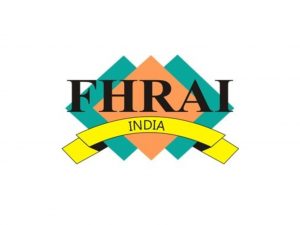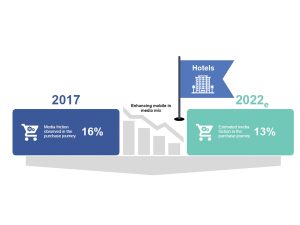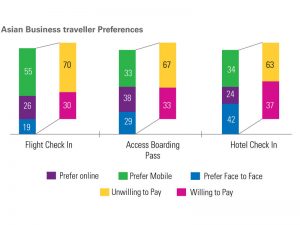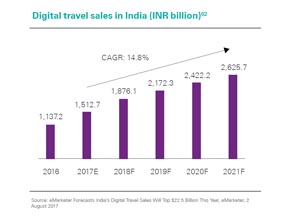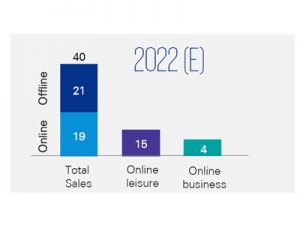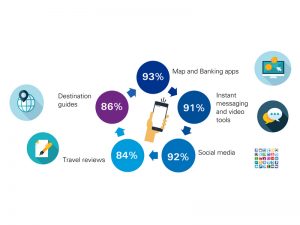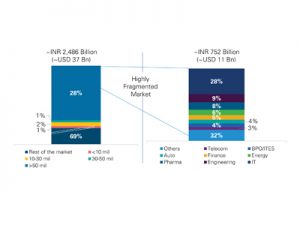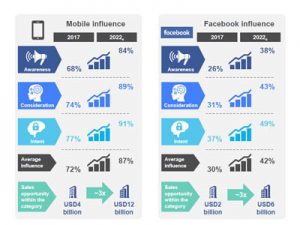According to a report prepared by FHRAI, KPMG and PHDCCI, India’s sustainable tourism market is projected to grow at CAGR of 19.3 per cent by 2032. Eco-tourism alone is projected to expand by 15.7 per cent from 2019 to 2027, reaching a staggering market size of US$4.55 billion.
Read More »Pilgrimage & spiritual tourism on the rise globally, reflects growing interest in faith-based travel: KPMG-PHDCCI Report
KPMG and PHDCCI in its report titled ‘Sacred Journeys: Unfolding the Evolution and Growth of Pilgrimage and Spiritual Tourism in India’ said that pilgrimage and spiritual tourism are rapidly expanding within the global tourism sector, reflecting a growing interest in cultural, spiritual, and faith-based travel. With over 450,000 religious and cultural heritage sites, India offers a wealth of pilgrimage and spiritual landmarks, highlighting its growth, economic impact, and future opportunities.
Read More »Amber Dubey appointed Joint Secretary, MoCA
Amber Dubey, Partner and Head- Aerospace and Defence, KPMG, has been appointed as the Joint Secretary at Ministry of Civil Aviation, Government of India, under the lateral entry scheme. An IIT and IIM alumnus, Dubey has been an aviation expert for years and is a known name in the industry. He is among the nine professionals to be appointed as Joint Secretaries in various ministries. The appointment will be on contract basis and has been done in Level 14 of the Pay Matrix as per the 7th Central Pay Commission for a period of three years.
Read More »9 out of 10 hotel bookings to be mobile-influenced by 2022
With the app economy gaining prominence and hotels increasingly encouraging consumers to have direct transactions, the role of mobile in hotel bookings is expected to increase. As per a study by KPMG-Facebook, 9 out of 10 bookings in the hotel category are expected to be mobile-influenced by 2022. The findings further suggest that in case of hotel bookings, 16 per cent of consumers drop out due to media friction and enhancing the media mix with mobile can reduce this friction by 3 percentage points, leading to a USD 2 billion opportunity for the brand within the category by 2022.
Read More »Business travellers prefer to go digital for flight and hotel check-ins
FCM Travel Solutions and KPMG’s recent whitepaper titled ‘The Digi-Smart Indian Business Traveller’ forecasts that amongst Asian business travellers, face-to-face interactions have become the least-popular option, except for hotel check-ins. They value the transparency of choice and information that autonomous digital channels, such as AI, can provide. Similarly, Indian business travellers are shifting to digital, with only 17 per cent of them preferring face-to-face interactions for process like flight check-ins. When choosing flights, convenient schedules and direct flights were consistently amongst the top-three priorities across all business travellers. Travel managers are aware of this and choose travel providers based on their ability to provide convenience and ease travellers’ journeys. Some these functions can be taken over by AI, which can process large about of data faster, and hence increase the efficiency and reduce cost.
Read More »Online sales of travel booking to increase at a CAGR of 15% during 2017–21
The online sales of travel booking is likely to increase at a CAGR of 14.8 per cent during 2017–21, according to FICCI and KPMG India’s latest knowledge paper titled ‘Expedition 3.0- Travel & Hospitality Gone Digital’. This uprising of digital travel in India can be attributed to the increasingly digitally savvy Indian travellers. In 2017, India was projected to have accounted for 3.7 per cent of the global digital travel sales — making it the third-largest market by value in the Asia-Pacific (APAC) region. The Indian government’s move to remove high currency notes out of circulation in November 2016 is expected to have further catalysed the growth of digital travel sales in the country 2017. The most significant reform in travel has been brought by mobile applications, which have enabled the whole user experience to be available on-the-go. These include usage of mobile tickets/boarding pass, mobile check-in for hotel rooms, cab hailing applications, and even cloud passports in some countries — in addition to the basic features such as search, booking, payment, invoicing and customer support.
Read More »Travel agents market in India to be valued at $40 billion by 2022
The Indian travel agents market is expected to reach USD40 bn by 2022, as per a latest study by KPMG and Google. The share of Online Travel Agents (OTAs) is set to increase to 47 per cent in 2022. Currently OTAs in India cater to a range of travel related booking services –airlines, accommodation and lodging, package holidays, cab rentals, cruise sales, travel insurance and other transport services. This includes both leisure and business travel sales. Leisure travel forms a majority of sales for OTAs and continues to remain the focus for major Indian OTAs in the near future. Few players in the accommodation and cab rental spaces maintain their own inventory. While aggregators are focused on on-boarding service providers onto their platform, players with own inventory are more focused on differentiating via service quality.
Read More »Indian business travellers use 20 different apps throughout their trip: FCM-KPMG study
FCM Travel Solutions and KPMG’s recent whitepaper titled ‘Redefining Corporate Travel Management’ forecasts that there is a growing demand for mobile capabilities in business travel due to higher volumes of millennial travellers. These travellers prefer to research and book both flights and accommodations on mobile. When booking a trip themselves, 60 per cent of India’s millennial business travellers do so online through their desktop or laptop, with 47 per cent of them booking through their smartphones. Travellers today want relevant and timely content at their fingertips. The shifting trends among Indian business travellers, before and during their journeys, is pushing the business travel industry to adapt continually to provide responsive, relevant and timely services for customers. Millennial travellers rely on technology for the entire travel booking process – from online reviews to mobile booking and check-in to staying connected with colleagues in a new city. Majority of travellers prefer online methods of research as it provides greater information, occasionally better deals and higher level of convenience. Hence, providing a seamless and mobile friendly travel experience in a business ecosystem, can help improve an employee’s overall travel experience. Business and leisure travellers alike are demanding greater omni-channel support throughout their travel journey. This presents a significant opportunity for travel management companies, as well as other businesses that support them. Such companies need to provide digital processes and support to enhance their customer’s experience.
Read More »IT companies have the highest travel spend among Indian business travel market
FCM Travel Solutions and KPMG’s recent whitepaper titled ‘Redefining Corporate Travel Management’ forecasts that the Indian business travel market is highly fragmented, with 70 per cent of corporates spending less than Rs 10 million. IT companies have the highest share amongst those spending more than Rs 10 million followed by engineering and pharmaceutical companies. IT, BPO/ITeS and pharmaceutical industries have higher travel spends as a percentage of their revenue. The cost incurred while travelling for business is the second highest operational cost for most organisations. Business travel is central to both maintaining business as well as expanding it and due to rising cost of travel, it is becoming imperative for corporates to drive higher levels of efficiency in their managed travel programme.
Read More »Mobiles to influence about 9 out of 10 hotel bookings by 2022
The ‘FB Travel Report’ commissioned by KPMG, Facebook and Nielsen suggests that nearly 90 per cent of hotel bookings in India are expected to be mobile-influenced by 2022, while nearly half of the hotel bookings in 2022 are expected to be Facebook-influenced, both nearly three times their current levels. This growth is expected to be driven on the backdrop of the swell in the traveller pool from an emerging middle class, niche experience-seeking consumers and increase in OTA bookings through mobiles in the five years between 2017 and 2022. Brands, therefore, have a USD 12 billion worth of incentive to re-look at their marketing strategies and adapt to the fast-evolving mobile-first internet economy of India.
Read More » Tourism Breaking News
Tourism Breaking News
